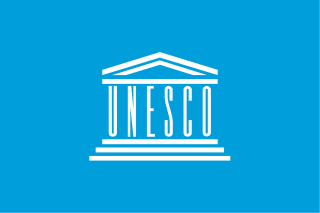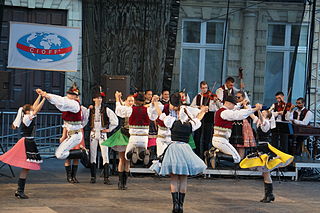
A World Heritage Site is a landmark or area with legal protection by an international convention administered by the UNESCO. World Heritage Sites are designated by UNESCO for having cultural, historical, scientific or other forms of significance. The sites are judged to contain "cultural and natural heritage around the world considered to be of outstanding value to humanity".
The International Council on Monuments and Sites is a professional association that works for the conservation and protection of cultural heritage places around the world. Now headquartered in Charenton-le-Pont, France, ICOMOS was founded in 1965 in Warsaw as a result of the Venice Charter of 1964 and offers advice to UNESCO on World Heritage Sites.
The Treaty on the Protection of Artistic and Scientific Institutions and Historic Monuments or Roerich Pact is an inter-American treaty. The most important idea of the Roerich Pact is the legal recognition that the defense of cultural objects is more important than the use or destruction of that culture for military purposes, and the protection of culture always has precedence over any military necessity.
Artistic freedom can be defined as "the freedom to imagine, create and distribute diverse cultural expressions free of governmental censorship, political interference or the pressures of non-state actors." Generally, artistic freedom describes the extent of independence artists obtain to create art freely. Moreover, artistic freedom concerns "the rights of citizens to access artistic expressions and take part in cultural life—and thus [represents] one of the key issues for democracy." The extent of freedom indispensable to create art freely differs regarding the existence or nonexistence of national instruments established to protect, to promote, to control or to censor artists and their creative expressions. This is why universal, regional and national legal provisions have been installed to guarantee the right to freedom of expression in general and of artistic expression in particular. In 2013, Ms Farida Shaheed, United Nations special rapporteur to the Human Rights Council, presented her "Report in the field of cultural rights: The right to freedom of expression and creativity" providing a comprehensive study of the status quo of, and specifically the limitations and challenges to, artistic freedom worldwide. In this study, artistic freedom "was put forward as a basic human right that went beyond the 'right to create' or the 'right to participate in cultural life'." It stresses the range of fundamental freedoms indispensable for artistic expression and creativity, e.g. the freedoms of movement and association. "The State of Artistic Freedom" is an integral report published by arts censorship monitor Freemuse on an annual basis.

The Hague Convention for the Protection of Cultural Property in the Event of Armed Conflict is the first international treaty that focuses exclusively on the protection of cultural property in armed conflict. It was signed at The Hague, Netherlands, on 14 May 1954 and entered into force on 7 August 1956. As of July 2021, it has been ratified by 133 states.

Cultural heritage is the heritage of tangible and intangible heritage assets of a group or society that is inherited from past generations. Not all heritages of past generations are "heritage"; rather, heritage is a product of selection by society.

The Convention on the Protection and Promotion of the Diversity of Cultural Expressions is an international treaty adopted in October 2005 in Paris during the 33rd session of the General Conference of the United Nations Educational, Scientific and Cultural Organization (UNESCO). In response to the fears that globalization would lead to an increasingly uniform global culture, it allows states to protect cultural diversity by promoting and defending their own cultural industries. It also establishes international co-operation to help protect the cultural industries of developing countries, including the creation of the International Fund for Cultural Diversity. It reaffirms many of the principles of the 2001 UNESCO Universal Declaration on Cultural Diversity but, unlike that declaration, it is legally binding and requires legal ratification by member states. The convention is the first international treaty to give cultural goods a special status, having cultural as well as economic value.
The International Music Council (IMC) was created in 1949 as UNESCO's advisory body on matters of music. It is based at UNESCO's headquarters in Paris, France, where it functions as an independent international non-governmental organization. Its primary aim is to facilitate the development and promotion of international music-making.

The Blue Shield, formerly the International Committee of the Blue Shield, is an international organization founded in 1996 to protect the world's cultural heritage from threats such as armed conflict and natural disasters. Originally intended as the "cultural equivalent of the Red Cross", its name derives from the blue shield symbol designed by Jan Zachwatowicz, used to signify cultural sites protected by the 1954 Hague Convention for the Protection of Cultural Property in Armed Conflict.
The German Commission for UNESCO is one of 195 National Commissions for UNESCO worldwide, a unique structure in the UN system, foreseen by UNESCO's constitution of 1946. The German Commission was founded on May 12, 1950, one year before West Germany was officially admitted to UNESCO. It has a liaison function for German Multilateral Foreign Cultural Policy; thus, its regular budget is financed by the Foreign Office. It is a chartered non-profit voluntary association with up to 114 members: Its members represent the German Federal government and the governments of the Laender, representatives of important German institutions working within UNESCO's fields of competence as well as individual experts.
The following outline is provided as an overview of and topical guide to the United Nations:

The World Heritage Convention, formally the Convention Concerning the Protection of the World Cultural and Natural Heritage, is an international treaty signed on 23 November 1972, which created the World Heritage Sites, with the primary goals of nature conservation and the preservation of cultural properties. The convention, a signed document of international agreement, guides the work of the World Heritage Committee. It was developed over a seven-year period (1965–1972).

EUCLID, also called Pôle Universitaire Euclide or Euclid University, is an international intergovernmental organization with a university charter established in 2008. It has official headquarters in The Gambia and in the Central African Republic, but also maintains an executive office in Washington, D.C. Its primary mandate is to train officials for its Participating States but its programs are also offered to the general public. The institution's current Secretary-General is Winston Dookeran.

The United Nations Educational, Scientific and Cultural Organization (UNESCO) is a specialized agency of the United Nations (UN) with the aim of promoting world peace and security through international cooperation in education, arts, sciences and culture. It has 194 member states and 12 associate members, as well as partners in the non-governmental, intergovernmental and private sector. Headquartered in Paris, France, UNESCO has 53 regional field offices and 199 national commissions.

Cultural property, also known as cultural patrimony, comprises the physical items that are part of the cultural heritage of a group or society, as opposed to less tangible cultural expressions. They include such items as cultural landscapes, historic buildings, works of art, archaeological sites, as well as collections of libraries, archives, and museums.

The World Database on Protected Areas (WDPA) is the largest assembly of data on the world's terrestrial and marine protected areas, containing more than 260,000 protected areas as of August 2020, with records covering 245 countries and territories throughout the world. The WDPA is a joint venture between the United Nations Environment Programme World Conservation Monitoring Centre and the International Union for Conservation of Nature World Commission on Protected Areas.

The International Council of Organizations of Folklore Festivals and Folk Arts is an international nongovernmental organization (NGO) in Official partnership with UNESCO and is accredited to provide advisory service to the Committee of the UNESCO Convention for the Safeguarding of Intangible Cultural Heritage. CIOFF has 63 full members, 21 associate members and 18 corresponding members worldwide and 3 partner members. Its headquarters are in Confolens in France. Full members are National Sections with the aim to preserve traditional art, to organize Folklore Festivals or similar activities as well as unite voluntary organizations, working in the field of dance, music, costumes, customs and ethnography. The National Sections belong to sectors in the organization according to their geographic location.
Biosphere reserves are areas comprising terrestrial, marine and coastal ecosystems. The biosphere reserve title is handed over by UNESCO. Each reserve promotes solutions reconciling the conservation of biodiversity with its sustainable use. Biosphere reserves are 'Science for Sustainability support sites' – special places for testing interdisciplinary approaches to understanding and managing changes and interactions between social and ecological systems, including conflict prevention and management of biodiversity. Biosphere reserves are nominated by national governments and remain under the sovereign jurisdiction of the states where they are located. Their status is internationally recognized.

The Commission to Preserve National Monuments of Bosnia and Herzegovina, abbr. KONS, is Bosnia and Herzegovina commission (agency) which declares and registers national heritage monuments/sites, including natural/urban/architectural assembles, immovable and movable heritage of historical and cultural importance to Bosnia and Herzegovina, as an institution at state level. The sites of exclusively natural heritage are not subject of Annex 8 and the KONS.

Cultural governance is governance of culture. It includes cultural policy made by governments but extends also to cultural influence exerted by non-state actors and to policies which influence culture indirectly.












